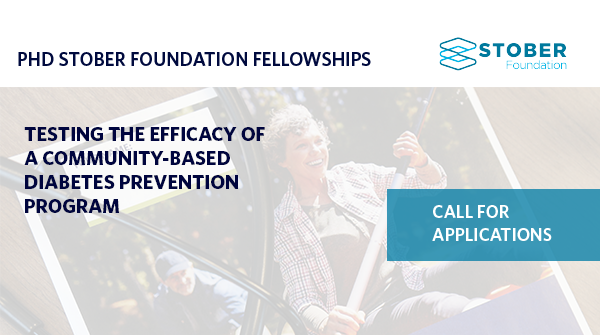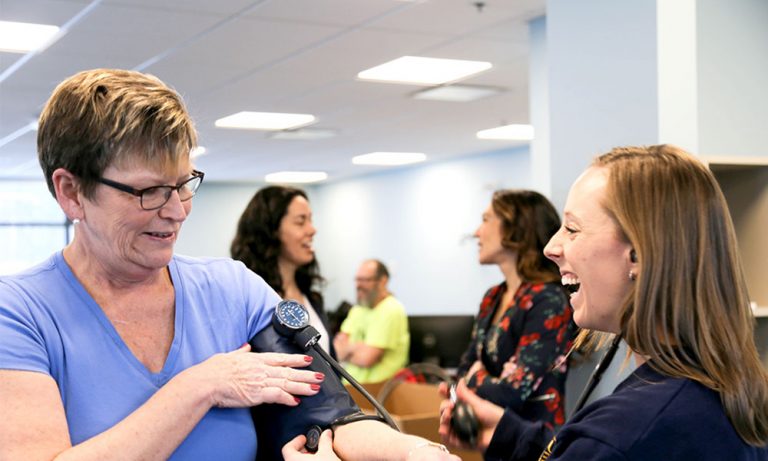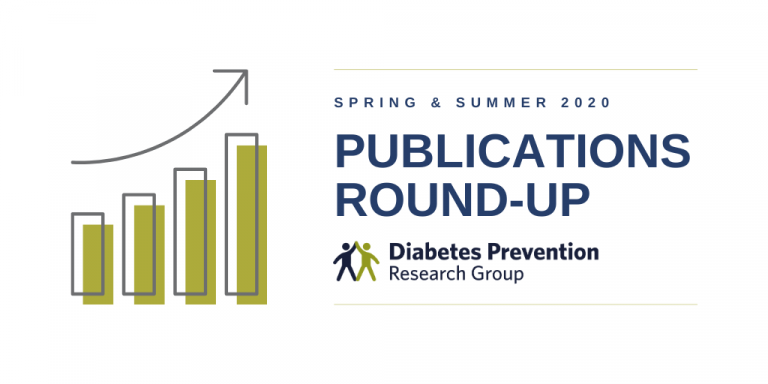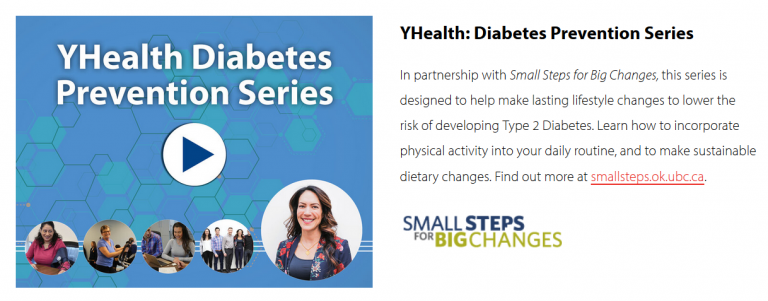This week, several DPRG graduate and undergraduate students presented at the 2021 UBC Vancouver & Okanagan Graduate Research Day on May 11 & 12.
Learn more about our student presentations, below.
Kaela Cranston
Process through partnership: The analysis, design, and development of an online training platform for Small Steps for Big Changes coaches with YMCA staff
Introduction. Small Steps for Big Changes (SSBC) is a diabetes prevention program that aims to empower individuals with prediabetes to make diet and exercise changes. Previously, SSBC coaches have been trained through a 3-day in-person workshop. In order to improve SSBC’s reach, an online platform is necessary to train coaches in a less resource-intensive manner. The creation of the SSBC online training platform was guided by the 5-phase analysis, design, development, implementation, and evaluation (ADDIE) model. The purpose of this project was to describe the analysis, design, and development phases of the SSBC online training platform. Methods. Focus groups with previously trained SSBC coaches were conducted to determine what skills, knowledge, and attitudes future coaches need to gain and how information should be delivered during the training. The research team worked with 3C Institute and SSBC coaches to determine learning objectives and the best way to deliver didactic and experiential components, develop scripts for the online modules, develop storyboard proofs, film the modules, develop a landing page, and finalize the online platform. Results. Recommendations from SSBC coaches were largely focussed on ensuring there were interactive components in the training and that SSBC content be better integrated with the motivational interviewing content. The final online training platform consisted of 7 modules and a resource centre. Conclusion. Using systematic methodology and engaging end-users and those with expertise in developing online learning platforms was necessary to develop a high-quality SSBC training platform for future scale-up.
Special congratulations to Kaela for winning Best Long Presentation Award for her presentation!
Tineke Dineen
Implementing a diabetes prevention program within a local community organization: A qualitative analysis
With type two diabetes on the rise, there is a need for more prevention programs to reach the large number of at-risk individuals. This research examined the implementation process, strategies, and multilevel contextual factors as an evidence-based diabetes prevention program was implemented into two local community organization sites. Guided by a pragmatic epistemology, semi-structured interviews were conducted with community organization staff who delivered the program (n = 8), and a focus group was completed with implementation support staff (n = 5) from both sites. Interviews were transcribed verbatim and thematically analyzed using a template approach guided by the consolidated framework for implementation research (CFIR). Within the template approach, themes were first inductively identified to ensure all salient ideas were captured, then identified themes were deductively linked to CFIR constructs. Implementation strategies used were appropriate, well-received by staff and promoted successful implementation. Several CFIR constructs were identified from all five domains: (a) process, (b) intervention characteristics, (c) outer setting, (d) inner setting, and (e) individual characteristics. Specifically, results revealed the partnered one-year planning process, program components and structure, level of support, and synergy between program and context were important factors in the implementation. Successful implementation was supported by a fully engaged, partnered approach to planning, and subsequently executing, an implementation effort. The CFIR provided a thorough framework to identify and evaluate multilevel contextual factors impacting implementation. Results demonstrate a successful approach to working with a community partner to support implementation.
Special congratulations to Tineke for winning the People’s Choice Award for her presentation!
Natalie Grieve
Let’s get digital: Examining the effectiveness of an online training program for diabetes prevention coaches
Small Steps for Big Changes (SSBC) is a diabetes prevention program in the Okanagan. SSBC includes guided exercise and counselling sessions for individuals with prediabetes. The program utilizes a motivational interviewing (MI) counselling style, which is a collaborative and client centered approach that aims to strengthen a client’s motivation to change. A standardized “train-the-trainer” workshop has been delivered face-to-face to train SSBC coaches, however this process logistically limits training opportunities and expansion of SSBC to other communities. As such, the development of an online program to deliver training to SSBC coaches is currently underway in partnership with an industry partner that specializes in developing digital learning platforms. The purpose of this project is to test the effectiveness of this new online training program for SSBC. Primary outcomes will include knowledge of diabetes, MI, SSBC content, and self-efficacy to deliver the program. User satisfaction and user engagement metrics will also be assessed. Outcomes will be assessed by psychometrically-sound questionnaires delivered pre- and post-study, as well as user engagement data. Once effectiveness of the online training program has been demonstrated, SSBC will be able to expand to more communities in a cost-effective and sustainable manner, while maintaining high program fidelity. Ultimately, this will allow the research team to extend their reach and help more Canadian adults living with prediabetes.
Cara Johnston
Diet and exercise interventions for ethnically diverse populations at risk for type 2 diabetes: a scoping review
Previous reviews have highlighted the efficacy of lifestyle diabetes prevention programs (DPPs) in decreasing the risk of type two diabetes (T2D). Ethnically diverse populations in high-income countries such as the United States and Canada are disproportionately affected by T2D; therefore, there is a need for research to focus on sustainable implementation and translation of DPPs to diverse ethnic populations identified as most at risk for developing T2D. This work aims to improve future DPP implementation by synthesizing intervention characteristics within published DPPs targeting ethnically diverse populations. An ongoing scoping review is being conducted to synthesize all published DPPs. Medline, CINAHL, PsycINFO, Embase, and SPORTDiscus were searched for terms relating to T2D risk and lifestyle programs. This project represents a sub-analysis of DPPs created for at risk adults who are part of an ethnically diverse population. Data regarding study characteristics will be systematically extracted using the Template for Intervention Description and Replication (TIDieR) checklist. 18,795 titles/abstracts were screened for inclusion. 789 progressed to full text review resulting in 200 DPPs. 39 DPPs were identified as targeting ethnically diverse populations and were included in this sub-analysis. Data extraction is currently underway and will ultimately inform future researchers on the scope of DPPs targeting ethnically diverse populations. Understanding how interventions targeting ethnically diverse populations are currently being implemented and summarizing them in a single location can assist future DPP developers in creating more targeted interventions, allow for more effective translation of DPPs, and reduce T2D in those most at risk.
Megan MacPherson
Developing a library of theory-based text messages to promote behaviour change adherence following the Small Steps for Big Changes diabetes prevention program
Diet and physical activity (PA) improvement can reduce type 2 diabetes (T2D) risk; however, long-term adherence to diet and PA is poor. Text messaging (SMS) is a cost-effective way to improve long-term diet and PA changes; however, SMS interventions often fail to report theoretical underpinnings. This study describes the development of a SMS library targeting diet and PA adherence following a diabetes prevention program using the Behaviour Change Wheel (BCW). The BCW is a synthesis of 19 behaviour change frameworks which provides structure to intervention design and has been used extensively in health behaviour change interventions. The following BCW stages were followed: identify (I) target behaviours and barriers/facilitators to engaging in them; (II) intervention options and policy categories; and (III) relevant behaviour change techniques (BCTs) associated with selected intervention options. A SMS library was then written to map onto identified BCTs and was coded for BCT fidelity. Target behaviours included adherence to diet and PA recommendations. Sixteen barriers/facilitators and 28 BCTs were identified through previous qualitative work. A total of 124 messages were written. Following the fidelity check, 43 unique BCTs were included in the final message library. Previous studies using the BCW have not checked BCT fidelity following intervention development. This step proved imperative in developing a comprehensive picture of active components. By reporting on the theoretical underpinnings, future research can understand not only if these messages are effective, but also why certain messages are more/less effective, and what combination of messages optimally influences behaviour.
Blessing Adeagbo
Receptiveness to Workplace Exercise
Physical activity in the general population is decreasing, while sedentary behaviours are concurrently increasing – and these trends have only been magnified in light of the COVID-19 pandemic. These patterns of behaviour have deleterious effects on health and therefore are an important target in improving population health outcomes. Adults spend a large proportion of their sedentary time in the workplace, where they are often required to spend long hours sitting and limited time moving. Further, COVID-19 has led to an increased proportion of people working from home. As such, the work environment is a viable target for physical activity interventions. “Exercise snacks” – short bouts (e.g., 20-60 seconds) of high-intensity exercise with 1-4 hours of rest in-between each bout – are one possible intervention. However, many workplace interventions are not informed by a comprehensive appraisal of all relevant behaviour change techniques, leading to ineffective programs and short-lived behaviour change. Therefore, the purpose of this study is to 1) investigate the determinants of participation in workplace exercise, 2) assess potential differences between individuals who work from home versus on-site, and 3) explore the considerations around the incorporation of exercise snacks into the workplace. Full time employees who report 6+ hours per workday of sitting and/or standing still will be recruited to participate in this study. Determinants and receptiveness will be assessed using a self-report survey, which includes the Determinants of Physical Activity Questionnaire. The findings from this research will help inform the development of future workplace exercise interventions for effective behaviour change.
Congratulations on your hard work and excellent presentations, Kaela, Tineke, Natalie, Cara, Megan, and Blessing!

 Saying goodbye to biases: Examining whether a 20-minute online module can reduce Human Kinetic students’ explicit biases on weight and race
Saying goodbye to biases: Examining whether a 20-minute online module can reduce Human Kinetic students’ explicit biases on weight and race Digital Diabetes Prevention Programs: A Scoping Review
Digital Diabetes Prevention Programs: A Scoping Review Receptiveness to Workplace Exercise
Receptiveness to Workplace Exercise




 It’s been a busy six months at the Diabetes Prevention Research Group this spring and summer! Our team has been hard at work translating research findings from our community-based health and exercise programs to publication. Take a look at a few of the articles that our group has published so far this year, below.
It’s been a busy six months at the Diabetes Prevention Research Group this spring and summer! Our team has been hard at work translating research findings from our community-based health and exercise programs to publication. Take a look at a few of the articles that our group has published so far this year, below.
